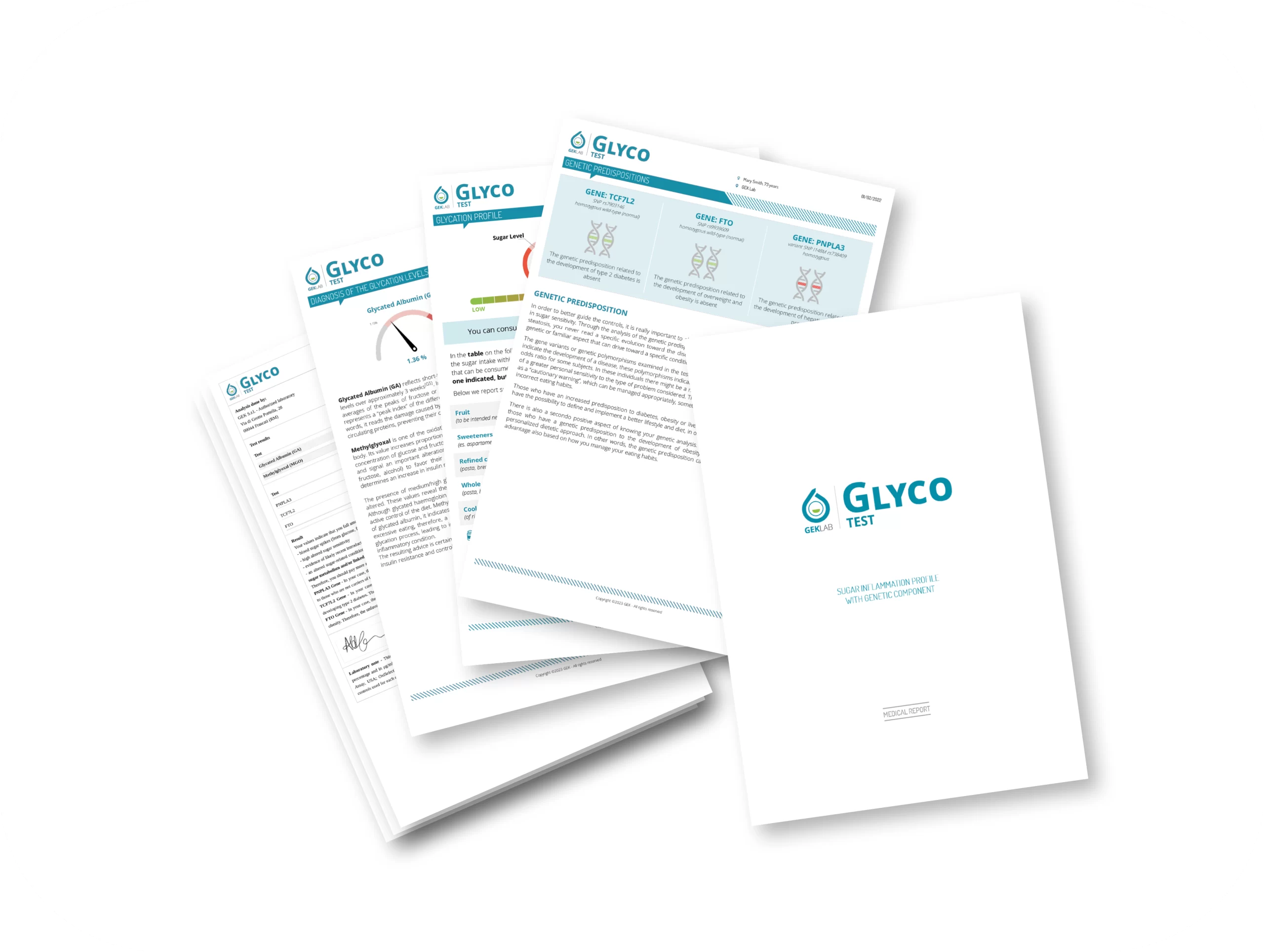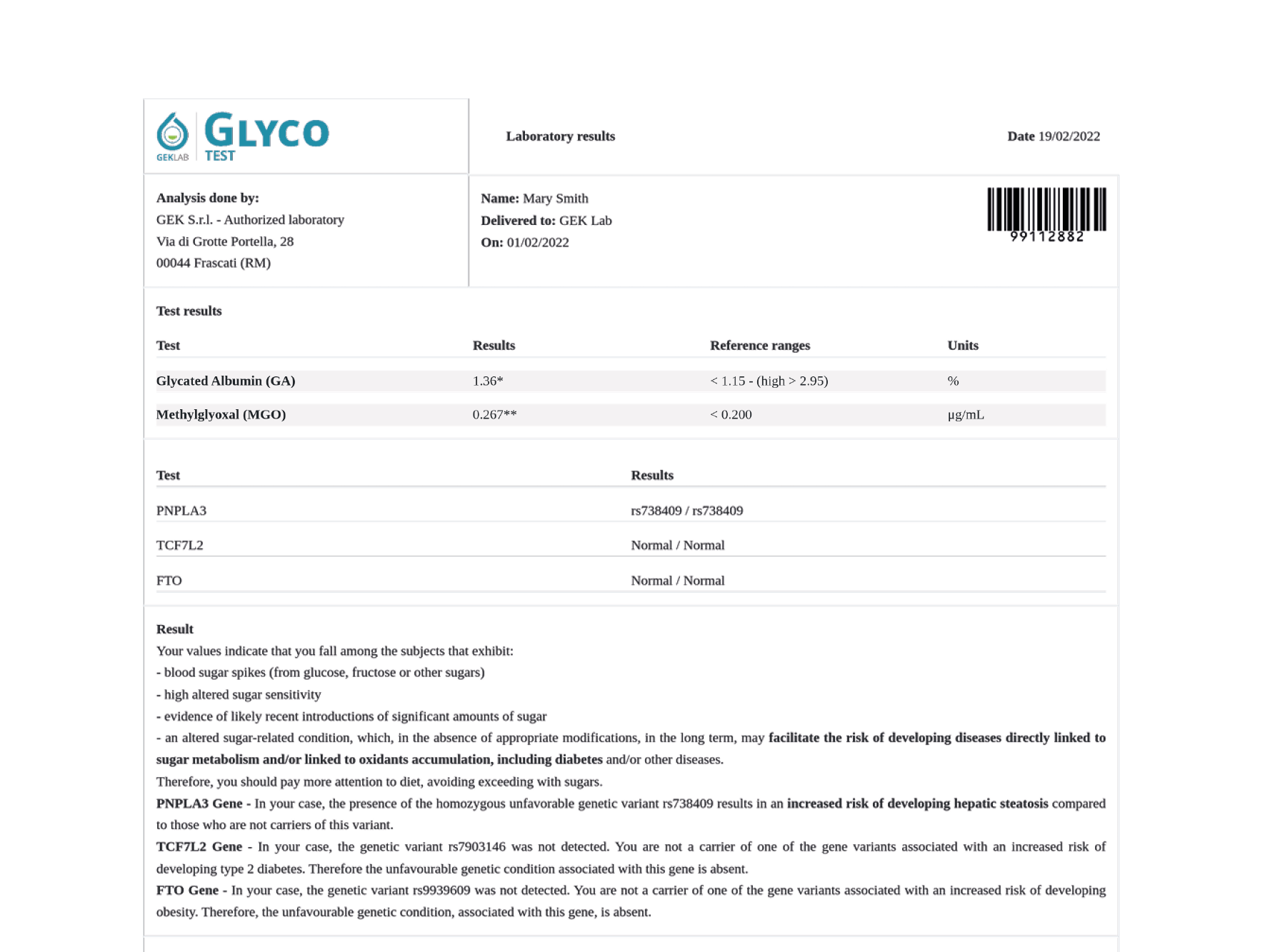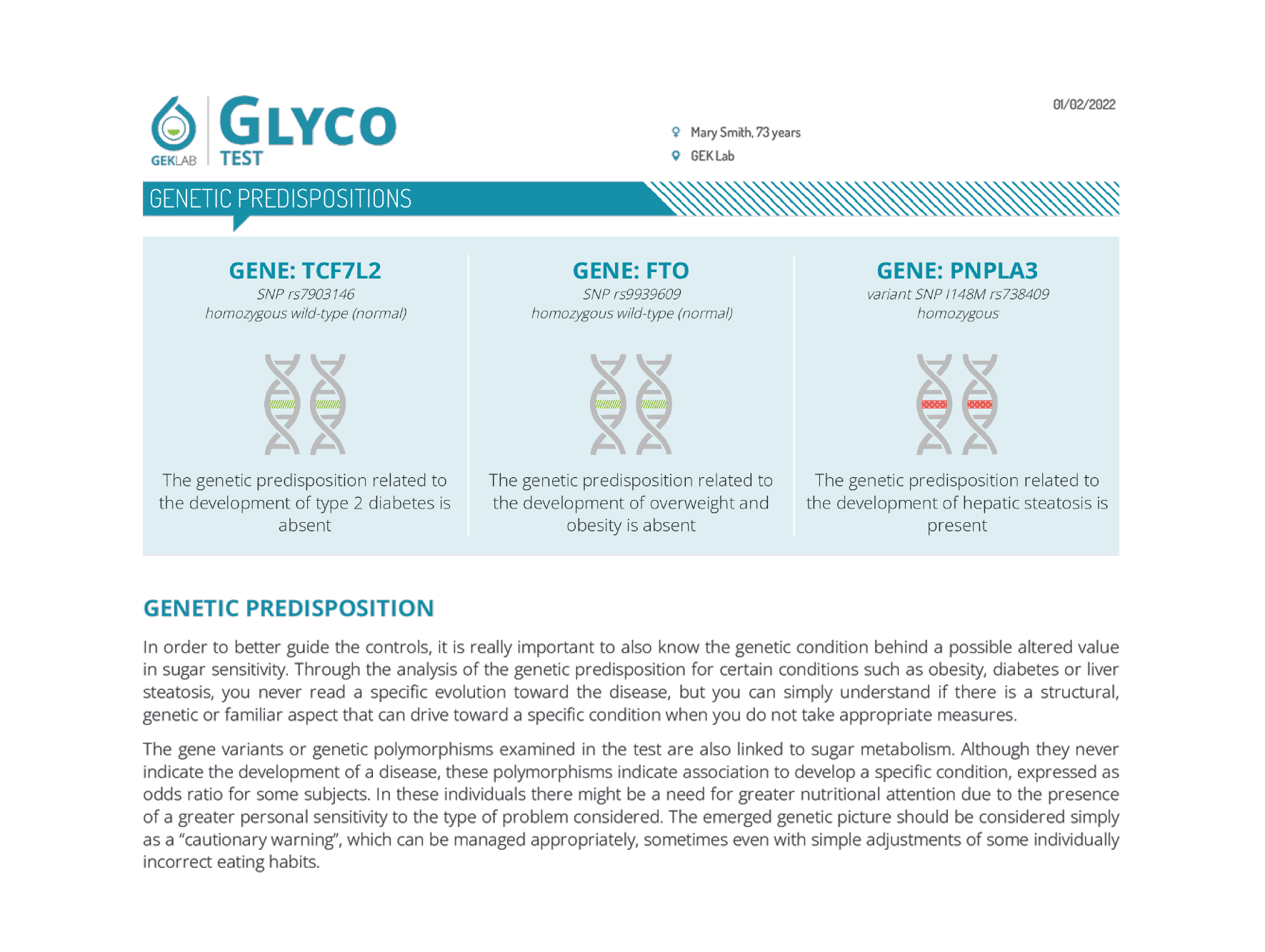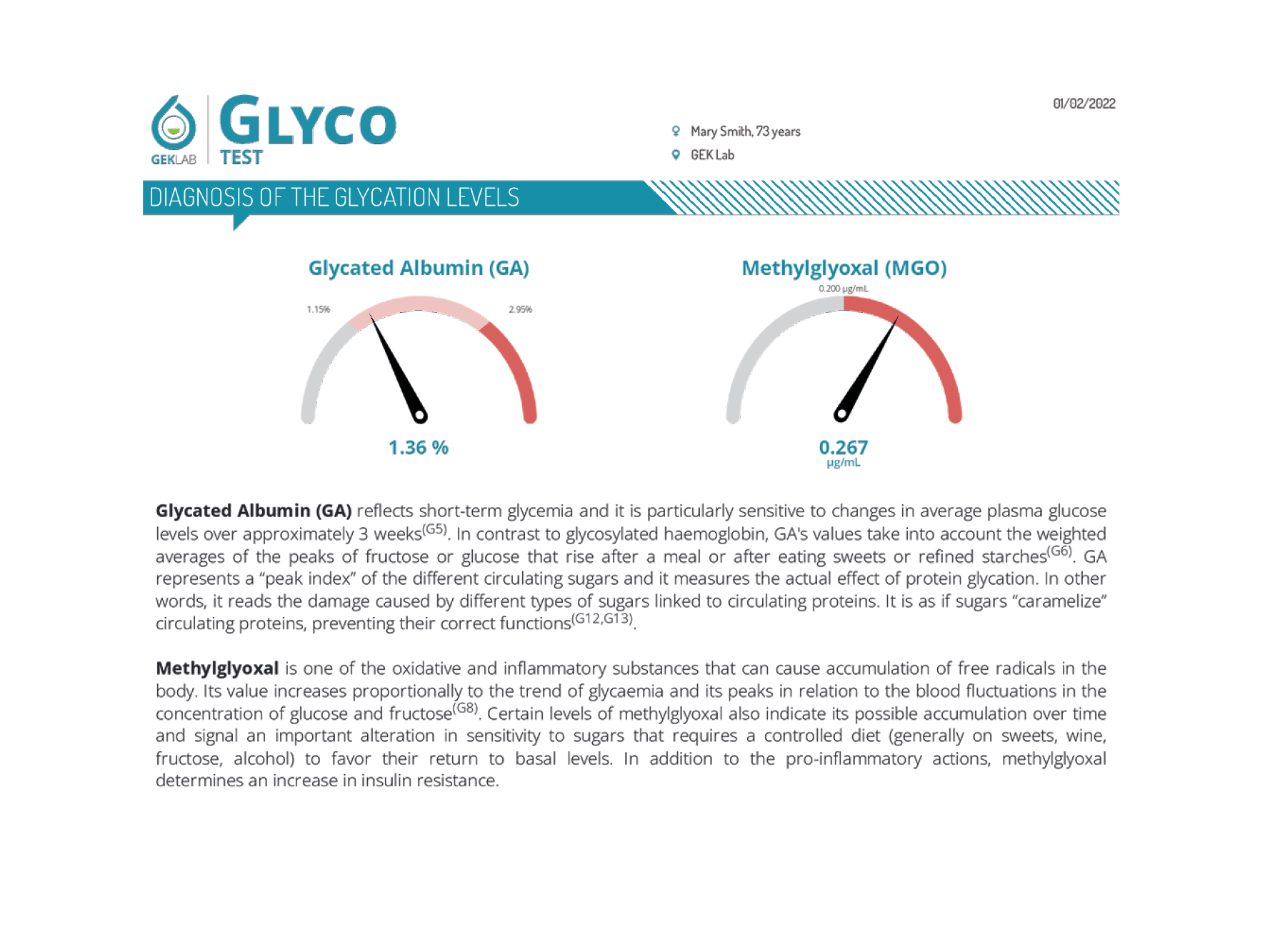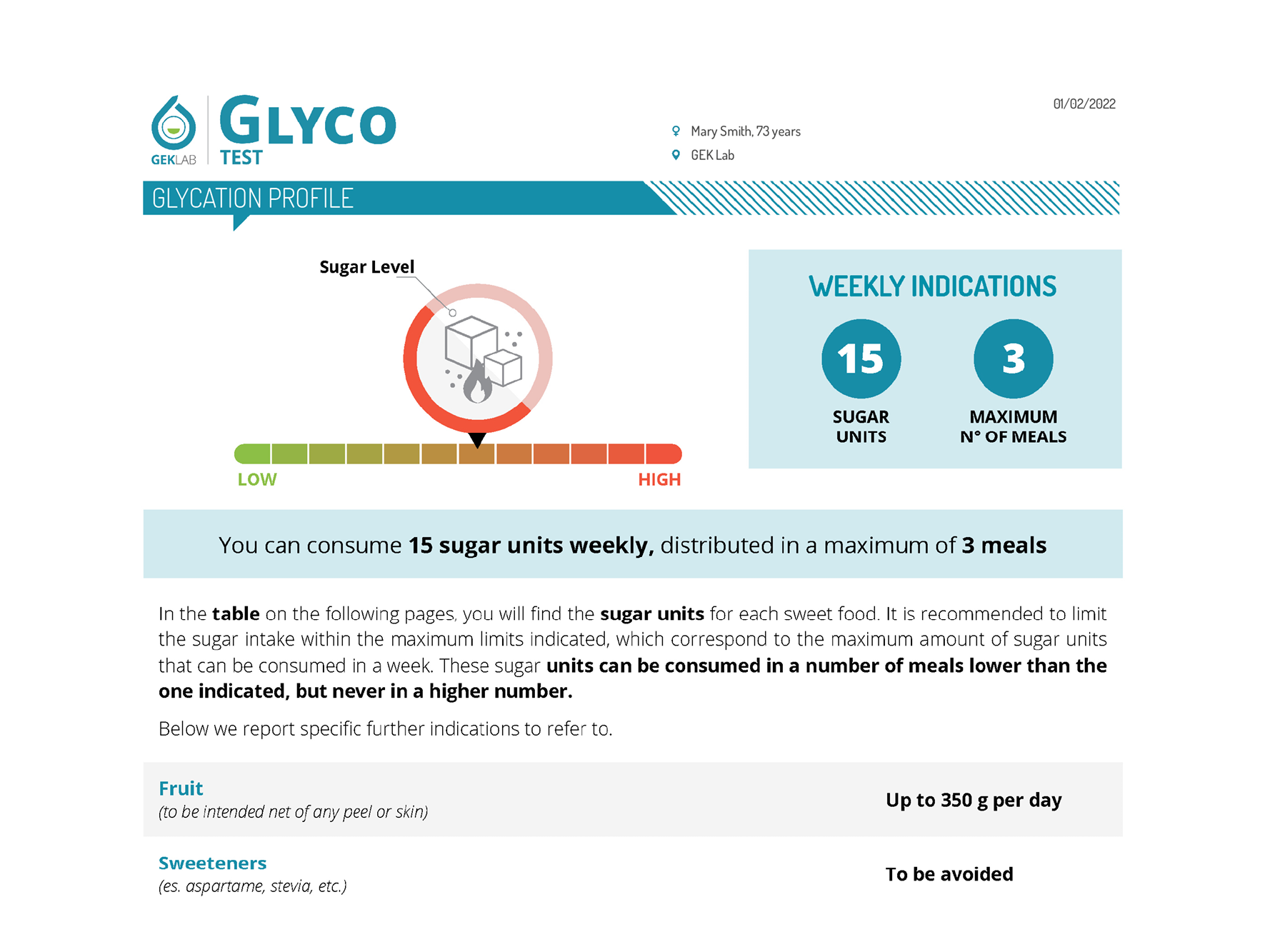
Glyco Test helps you understand if you’re consuming excess sugars by measuring the inflammation in your body and interpreting any genetic predisposition to developing diabetes, obesity, and fatty liver. The doctors and specialists at GEK Lab, experts in precision medicine, will assess your level of glycation and suggest a personalized nutritional and integrative path that meets your needs.
Also available at GEK Lab locations

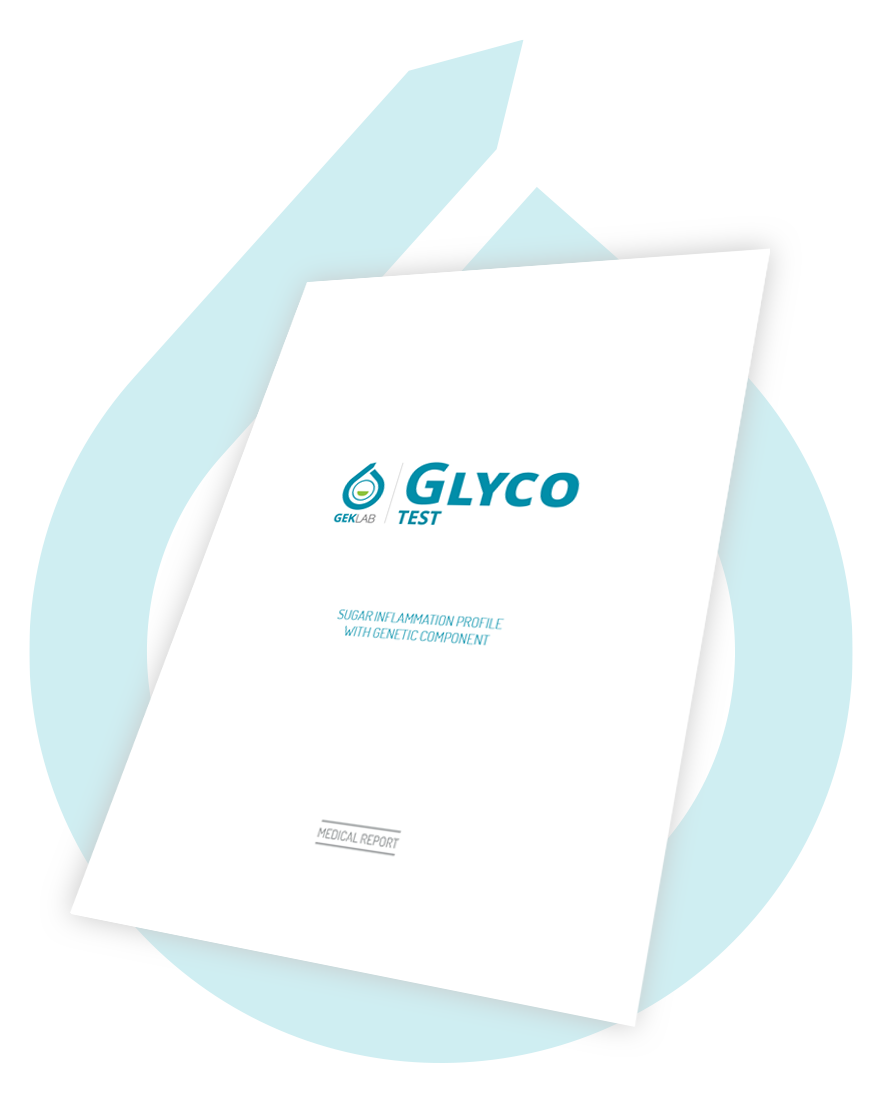
What do I get from my Glyco Test?
- A medical diagnosis based on the interpretation of laboratory data.
- Measurement of your levels of glycation and sugar-induced inflammation through the analysis of two molecules: glycated albumin and methylglyoxal, which also highlight the potentially harmful effects of all types of sugars and polyols (such as fructose, glucose, maltose, sorbitol, galactose, and others) and alcohol.
- Evaluation of any genetic polymorphisms that characterize a greater personal susceptibility to the development of diabetes, obesity, and fatty liver.
- 6 months of free access to the MyGEK Lab service, a scientific consulting service that provides a collection of frequently asked questions and direct contact with a team of nutritionists.
- Personalized integrative advice: what are the active principles useful to contrast your levels of oxidation detected by the test.

The Glyco Test addresses the following aspects


FAQ
Inflammation caused by sugars is an inflammatory condition fueled by an individually excessive intake of sugars and substances such as fructose, sweeteners, and alcohol, which behave similarly to sugar. These substances can bind to proteins or other circulating molecules in the body, altering their structure and function through a process known as glycation. Glycation increases glycated albumin values and the production of methylglyoxal, a free radical capable of oxidizing body tissues. Our test measures both markers to define early sugar damage.
The symptoms and conditions related to sugar-induced inflammation include hives, itching, chronic headaches, difficulty losing weight, increased insulin resistance, cystitis, recurrent candidiasis, canker sores, cognitive decline, fatty liver, diabetes, and obesity.
Despite having normal blood sugar levels and glycated hemoglobin values, unfortunately, they are not able to assess sugar damage early, as they are only altered in the presence of glucose and only after it has been altered for a considerable time. Different molecules (such as fructose, alcohol, and sweeteners including sorbitol, xylitol, or sucralose), despite having an identical metabolic effect to sugar, require different markers to be “read”. Methylglyoxal and Glycated Albumin, however, precisely capture all the mentioned substances and therefore allow an effective reading of the level of glycation, that is, the changes induced by sugars and similar substances.
The Glyco Test allows for a comprehensive evaluation of sugar-related damage in the body, thanks to two markers: Glycated Albumin and Methylglyoxal. Unlike glycated hemoglobin and blood sugar, these molecules can detect substances other than glucose that have a similar detrimental effect on the body when individually consumed excessively. Fructose (even naturally occurring in fruit), alcoholic beverages, and sweeteners can all increase glycation levels, potentially leading to serious disorders and pathologies. The Glyco Test enables both prevention and proactive intervention in sugar-related inflammation, thereby improving individual well-being.
No. Sweeteners (xylitol, sorbitol, mannitol, sucralose, erythritol, and others) despite being calorie-free, lead to a significant increase in Methylglyoxal levels, a highly oxidizing substance capable of modifying tissues in the body, causing serious damage, including irreversible damage. Methylglyoxal is linked not only to a higher incidence of death from all causes but also to cognitive decline, attention deficits, headaches, skin rashes, and reduced performance.
Sugar intake has been recognized as a full-fledged addiction, comparable to alcohol and tobacco addiction. The Glyco Test allows for precise measurement of sugar and sugar-like substance damage, enabling personalized modulation of their intake throughout the week. In the Glyco Test report, sugars are never eliminated but rather precisely incorporated into the weekly plan with the help of personalized menus. These menus help reduce the constant craving for sugars on one hand, and on the other hand, modulate their detrimental effects on the body, avoiding unnecessary restrictive diets that are physically and psychologically unsustainable in the medium to long term.
Diabetes, fatty liver, and obesity are the most prevalent chronic and degenerative conditions with the greatest negative effects in the twenty-first century. Understanding in advance the possible presence of a genetic predisposition allows for preventive action on their development through targeted dietary strategies tailored to one’s own metabolic and genetic characteristics. While genetic makeup cannot be changed, environmental factors can influence epigenetics, i.e., the expression of these genes. Diet is one of the most relevant environmental factors, and the Glyco Test helps to establish a dietary plan that is appropriate and personalized.
In the presence of diabetes in the family, the propensity to develop this condition is inherently higher. For this reason, it is useful to take action in advance using innovative markers that measure sugar damage not detected by classical markers such as blood sugar and glycated hemoglobin. Glycated Albumin and Methylglyoxal are instead inflammatory molecules correlated with sugar damage and also detect molecules other than glucose. Therefore, the GlycoTest allows for the identification of sugar dysmetabolism even if the classic values are still within normal range. Additionally, the GlycoTest evaluates the genetic predisposition to develop diabetes through DNA analysis.
Hair fall or loss is partly physiological. However, when it is excessive, it becomes a symptom of systemic discomfort.
The most common causes are hormonal, nutritional (hair responds quickly to the deficiency of certain nutrients), and/or inflammatory. It is important to know that nutrition and lifestyle play a fundamental role in the treatment, as well as in the prevention and management of this symptom. Studies have highlighted a correlation between hair loss and glycation, suggesting that those who show significant hair loss tend to consume twice as much sugar as those who do not exhibit this symptom. Performing the Glyco Test allows for the detection of early sugar damage potentially present in the body and, through a personalized diet, allows for the recovery of scalp well-being.
When attention deficits, concentration, or memory lapses are present, it is important to understand if the energy intake throughout the day, starting from breakfast, is correct. A test like the Glyco Test allows for investigation into sugar inflammation and defining, if present, sudden glycemic spikes, potentially harmful and responsible for energy and attention deficits even in children. Careful monitoring in meal planning, control over the intake of simple sugars and/or substances metabolically similar to sugar can be decisive in improving attention, energy levels, and academic or professional performance.
Type 2 diabetes is a chronic condition that involves inadequate response of the body to insulin or insufficient insulin production. It is possible to effectively manage and control the disease through a combination of lifestyle changes and, in some cases, medication. Lifestyle changes include healthy eating, regular physical activity, and maintaining a healthy body weight. These factors can improve insulin sensitivity and contribute to blood glucose control. In some cases, monitoring and appropriate treatment can lead to remission of type 2 diabetes, where blood sugar levels return to normal without the need for medication. The use of the Glyco Test is essential for monitoring the effects of the diet over time. Through personalized nutrition, properly balancing meals maintains a balance between overall well-being and the possibility of indulging in occasional healthy and tasty sweets.
Several scientific studies have suggested that high sugar intake, especially simple sugars and refined carbohydrates, may be associated with fertility problems in both men and women. In men, excess sugar can affect sperm quality and reproductive function: some studies have suggested that a high-sugar diet may be associated with reduced sperm motility. In women, excess sugar can contribute to insulin resistance and polycystic ovary syndrome (PCOS), both conditions linked to fertility issues. A personalized diet defined through the measurement of innovative markers present in the Glyco Test allows for the identification of possible early sugar damage and intervention to reduce sugar-related inflammation while maintaining a healthy, varied, and conscious diet.
Several studies have highlighted a connection between cognitive decline and glycation. In particular, the accumulation of methylglyoxal indicates the presence of ongoing oxidative stress, which can also lead to neuronal alterations. Evaluating individual glycation levels, i.e., the amount of sugars or carbohydrates consumed in excess compared to needs, can provide information about possible cognitive decline. The relationship between diet, glycation, and neurodegenerative diseases has been emphasized in recent years, confirming the role of sugars as a factor predisposing to the onset and progression of neurodegenerative diseases, including Alzheimer’s. The presence of high levels of methylglyoxal, measurable through the Glyco Test, is considered a preliminary signal that could facilitate the deposition of amyloid and, therefore, an early sign of cognitive decline.
High sugar consumption in the diet can contribute to an increase in cholesterol, particularly LDL (low-density lipoprotein) cholesterol, commonly known as “bad cholesterol.” There are several ways in which excessive sugar consumption can affect cholesterol levels:
- Increase in triglycerides: Triglycerides are a form of fat, and elevated levels can contribute to an increase in LDL cholesterol.
- Insulin resistance: It can trigger an increase in cholesterol production by the liver.
- Weight gain: This, in turn, can negatively impact cholesterol levels.
- Promotion of inflammation: Excess sugar can contribute to inflammation, which is linked to the atherosclerosis process, the formation of plaques in the arteries that can influence cholesterol levels.”



Find the Perfect Test for You
Choose the test that best suits your needs by answering the questions in our personalized questionnaire. Your health is unique, and we want to provide you with a tailor-made journey. Answer now and discover which GEK test is the right choice for you.

Simple and Reliable
Purchase the test online or at an authorized GEK Lab center. Our method is simple and fast: a straightforward capillary sample will be analyzed in our laboratory and reported by our experienced medical team. Discover the convenience of taking care of your health with GEK Lab.

Your Report at the Click of a Button
Receive your personalized medical report at the authorized GEK Lab center or download it directly through our MyGEKLab service. Access securely and quickly to keep your health under control at all times. With GEK Lab, your wellness journey is more accessible than ever.

Invest in Your Health
Put the recommendations of the report into practice to invest in your health and regain your ideal shape. Discover how to adopt a dietary style that promotes well-being, recognizing the positive effects on your body. Our nutritional counseling service, MyGEKLab, is at your disposal for any questions: Your well-being is our priority.

